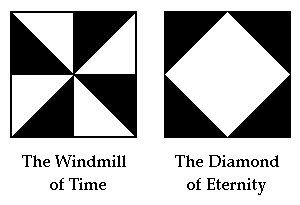* See Crichton's Rising Sun in this journal.
Wednesday, August 7, 2019
Monday, June 3, 2024
Review
|
Excerpt from a Log24 post of May 2, 2003 Though truth may be very hard to find in the pages of most books, the page numbers are generally reliable. This leads to the following Zen meditations. From a review of the film “The Terminator”:
From a journal note on religion, science, and the meaning of life written in 1998 on the day after Sinatra died and the Pennsylvania lottery number came up “256”:
From Michael Crichton’s Rising Sun John Connor (aka J. C.) offers the following metaphysical comment on the page number that appears above his words (256):
Connor is correct. The number 256 does indeed seem to be, and indeed it seemed to be again only yesterday evening, when the Pennsylvania lottery again made a metaphysical statement. Our Zen meditation on the trustworthiness of page numbers concludes with another passage from Rising Sun, this time on page 373:
Here J. C. offers another trenchant comment on his current page number. The metaphysical significance of 373, “the eternal in the temporal,” is also discussed in the Buddhist classic A Flag for Sunrise, by Robert Stone (Knopf hardcover, 1981) … on, of course, page 373. |
Related graphic art —

This is from a Log24 search, "Windmill + Diamond."
Friday, October 8, 2010
Starting Out in the Evening
… and Finishing Up at Noon
This post was suggested by last evening’s post on mathematics and narrative
and by Michiko Kakutani on Vargas Llosa in this morning’s New York Times.

Above: Frank Langella in Right: Johnny Depp in |
 |
“One must proceed cautiously, for this road— of truth and falsehood in the realm of fiction— is riddled with traps and any enticing oasis is usually a mirage.”
— “Is Fiction the Art of Lying?”* by Mario Vargas Llosa, New York Times essay of October 7, 1984
My own adventures in that realm— as reader, not author— may illustrate Llosa’s remark.
A nearby stack of paperbacks I haven’t touched for some months (in order from bottom to top)—
- Pale Rider by Alan Dean Foster
- Franny and Zooey by J. D. Salinger
- The Hobbit by J. R. R. Tolkien
- Le Petit Prince by Antoine de Saint Exupéry
- Literary Reflections by James A. Michener
- The Ninth Configuration by William Peter Blatty
- A Streetcar Named Desire by Tennessee Williams
- Nine Stories by J. D. Salinger
- A Midsummer Night’s Dream by William Shakespeare
- The Tempest by William Shakespeare
- Being There by Jerzy Kosinski
- What Dreams May Come by Richard Matheson
- Zen and the Art of Motorcycle Maintenance by Robert M. Pirsig
- A Gathering of Spies by John Altman
- Selected Poems by Robinson Jeffers
- Hook— Tinkerbell’s Challenge by Tristar Pictures
- Rising Sun by Michael Crichton
- Changewar by Fritz Leiber
- The Painted Word by Tom Wolfe
- The Hustler by Walter Tevis
- The Natural by Bernard Malamud
- Truly Tasteless Jokes by Blanche Knott
- The Man Who Was Thursday by G. K. Chesterton
- Under the Volcano by Malcolm Lowry
What moral Vargas Llosa might draw from the above stack I do not know.
Generally, I prefer the sorts of books in a different nearby stack. See Sisteen, from May 25. That post the fanciful reader may view as related to number 16 in the above list. The reader may also relate numbers 24 and 22 above (an odd couple) to By Chance, from Thursday, July 22.
* The Web version’s title has a misprint— “living” instead of “lying.”
Friday, May 2, 2003
Friday May 2, 2003
ART WARS:
The following flashback to March 2002 seems a suitable entry for May, which is Mental Health Month.
Zen and Language Games
by Steven H. Cullinane
on March First, 2002
Two Experts Speak —
A Jew on Language Games
From On Certainty, by Ludwig Wittgenstein (Oxford, Basil Blackwell, 1969):
#508: What can I rely on?
#509: I really want to say that a language game is only possible if one trusts something. (I did not say “can trust something”).
— Quoted by Hilary Putnam in Renewing Philosophy, Chapter 8 (Harvard University Press, 1992)
An Arab on Deconstruction
From “Deconstructing Postmodernism,” by Ziauddin Sardar, at the website “The Free Arab Voice”:
Doubt, the perpetual and perennial condition of postmodernism, is best described by the motto of the cult television series The X-files: ‘Trust no One’….
Deconstruction – the methodology of discursive analysis – is the norm of postmodernism. Everything has to be deconstructed. But once deconstruction has reached its natural conclusion, we are left with a grand void: there is nothing, but nothing, that can remotely provide us with meaning, with a sense of direction, with a scale to distinguish good from evil.
Those who, having reviewed a thousand years of lies by Jews, Arabs, and Christians, are sick of language games, and who are also offended by the recent skillful deconstruction of the World Trade Center, may find some religious solace in the philosophy of Zen.
Though truth may be very hard to find in the pages of most books, the page numbers are generally reliable. This leads to the following Zen meditations.
From a review of the film “The Terminator”:
Some like to see Sarah as a sort of Mother of God, and her son as the saviour in a holy context. John Connor, J.C. , but these initials are also those of the director, so make up your own mind.
— http://www.geocities.com/
hackettweb2/terminator.html
From a journal note on religion, science, and the meaning of life written in 1998 on the day after Sinatra died and the Pennsylvania lottery number came up “256”:
“What is 256 about?”
— S. H. Cullinane
From Michael Crichton’s Rising Sun (Ballantine paperback, 1993) —
John Connor (aka J. C.) offers the following metaphysical comment on the page number that appears above his words (256):
“It seems to be.”
“Is your investigation finished?”
“For all practical purposes, yes,” Connor said.
Connor is correct. The number 256 does indeed seem to be, and indeed it seemed to be again only yesterday evening, when the Pennsylvania lottery again made a metaphysical statement.
Our Zen meditation on the trustworthiness of page numbers concludes with another passage from Rising Sun, this time on page 373:
Connor sighed.
“The clock isn’t moving.”
Here J. C. offers another trenchant comment on his current page number.
The metaphysical significance of 373, “the eternal in the temporal,” is also discussed in the Buddhist classic A Flag for Sunrise, by Robert Stone (Knopf hardcover, 1981)… on, of course, page 373.
